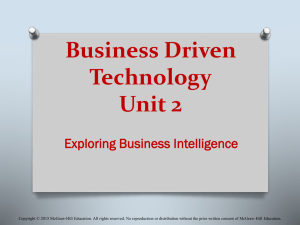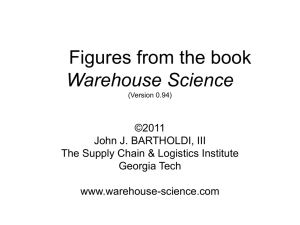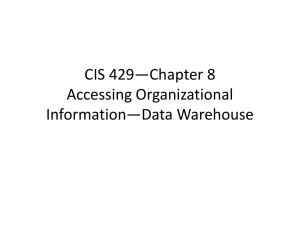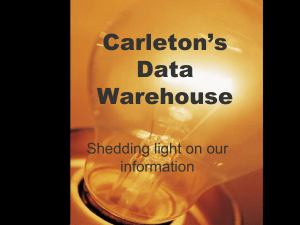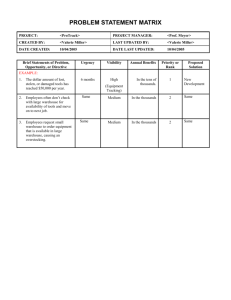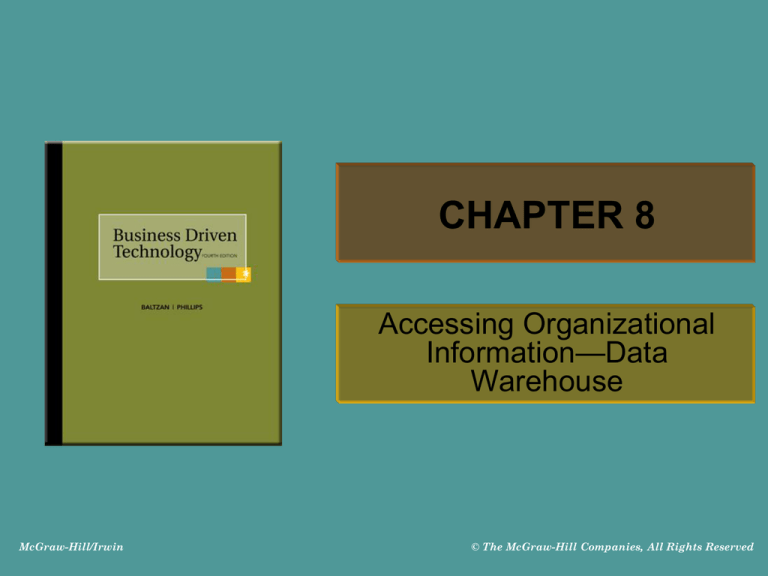
CHAPTER 8
Accessing Organizational
Information—Data
Warehouse
McGraw-Hill/Irwin
© The McGraw-Hill Companies, All Rights Reserved
LEARNING OUTCOMES
8.1
Describe the roles and purposes of data
warehouses and data marts in an
organization
8.2
Compare the multidimensional nature of
data warehouses (and data marts) with
the two-dimensional nature of databases
8-2
LEARNING OUTCOMES
8.3
Identify the importance of ensuring the
cleanliness of information throughout an
organization
8.4
Explain the relationship between
business intelligence and a data
warehouse
8-3
HISTORY OF DATA WAREHOUSING
• Data warehouses extend the transformation of
data into information
• In the 1990’s executives became less
concerned with the day-to-day business
operations and more concerned with overall
business functions
• The data warehouse provided the ability to
support decision making without disrupting the
day-to-day operations
8-4
DATA WAREHOUSE
FUNDAMENTALS
• Data warehouse – a logical collection of
information – gathered from many different
operational databases – that supports business
analysis activities and decision-making tasks
• The primary purpose of a data warehouse is to
aggregate information throughout an
organization into a single repository for
decision-making purposes
8-5
DATA WAREHOUSE
FUNDAMENTALS
• Extraction, transformation, and loading
(ETL) – a process that extracts information from
internal and external databases, transforms the
information using a common set of enterprise
definitions, and loads the information into a data
warehouse
• Data mart – contains a subset of data
warehouse information
8-6
DATA WAREHOUSE
FUNDAMENTALS
8-7
Multidimensional Analysis
and Data Mining
• Databases contain information in a series
of two-dimensional tables
• In a data warehouse and data mart,
information is multidimensional, it contains
layers of columns and rows
– Dimension – a particular attribute of
information
8-8
Multidimensional Analysis
and Data Mining
• Cube – common term for the
representation of multidimensional
information
8-9
Multidimensional Analysis
and Data Mining
• Data mining – the process of analyzing data to
extract information not offered by the raw data
alone
• To perform data mining users need data-mining
tools
– Data-mining tool – uses a variety of techniques to
find patterns and relationships in large volumes of
information and infers rules that predict future
behavior and guide decision making
8-10
Information Cleansing or Scrubbing
• An organization must maintain highquality data in the data warehouse
• Information cleansing or scrubbing – a
process that weeds out and fixes or
discards inconsistent, incorrect, or
incomplete information
8-11
Information Cleansing or Scrubbing
• Contact information in an operational system
8-12
Information Cleansing or Scrubbing
• Standardizing Customer name from Operational Systems
8-13
Information Cleansing or Scrubbing
• Information cleansing activities
8-14
Information Cleansing or Scrubbing
• Accurate and complete information
8-15
BUSINESS INTELLIGENCE
• Business intelligence – information that
people use to support their decisionmaking efforts
• Principle BI enablers include:
– Technology
– People
– Culture
8-16
OPENING CASE STUDY QUESTIONS
It Takes A Village to Write an Encyclopedia
1. Determine how Wikipedia could use a data
warehouse to improve its business operations
2. Explain why Wikipedia must cleanse or scrub
the information in its data warehouse
3. Explain how a company could use information
from Wikipedia to gain business intelligence
8-17
CHAPTER EIGHT CASE
Mining the Data Warehouse
• According to a Merrill Lynch survey in
2006, business intelligence software and
data-mining tools were at the top of the
technology spending list of CIOs
• Ben & Jerry’s, California Pizza Kitchen,
and Noodles & Company are using
business intelligence and data mining in
new and exciting ways
8-18
CHAPTER EIGHT CASE QUESTIONS
1. Explain how Ben & Jerry’s is using
business intelligence tools to remain
successful and competitive in a
saturated market
2. Identify why information cleansing and
scrubbing is critical to California Pizza
Kitchen’s business intelligence tool’s
success
8-19
CHAPTER EIGHT CASE QUESTIONS
3. Illustrate why 100 percent accurate and
complete information is impossible for
Noodles & Company to obtain
4. Describe how each of the companies above is
using BI from their data warehouse to gain a
competitive advantage
8-20
BUSINESS DRIVEN
TECHNOLOGY
UNIT TWO CLOSING
McGraw-Hill/Irwin
© The McGraw-Hill Companies, All Rights Reserved
UNIT CLOSING CASE ONE
Harrah’s – Gambling Big on Technology
1. Identify the effects poor information might have
on Harrah’s service-oriented business strategy
2. Summarize how Harrah’s uses database
technologies to implement its service-oriented
strategy
3. Harrah’s was one of the first casino companies
to find value in offering rewards to customers
who visit multiple Harrah’s locations. Describe
the effects on the company if it did not build
any integrations among the databases located
at each of its casinos
8-22
UNIT CLOSING CASE ONE
Harrah’s – Gambling Big on Technology
4. Estimate the potential impact to Harrah’s
business if there is a security breach in its
customer information
5. Explain the business effects if Harrah’s fails to
use data-mining tools to gather business
intelligence
6. Identify three different types of data marts
Harrah’s might want to build to help it analyze
8-23
its operational performance
UNIT CLOSING CASE ONE
Harrah’s – Gambling Big on Technology
7. Predict what might occur if Harrah’s fails to
clean or scrub its information before loading it
into its data warehouse
8. How could Harrah’s use data mining to
increase revenue?
8-24
UNIT CLOSING CASE TWO
Searching for Revenue - Google
1. Determine if Google’s search results are
examples of transactional information or analytical
information
2. Describe the ramifications on Google’s business if
the search information it presented to its
customers was of low quality
3. Explain how the website RateMyProfessors.com
solved its problem of poor information
8-25
UNIT CLOSING CASE TWO
Searching for Revenue - Google
4. Identify how Google could use a data warehouse to
improve its business
5. Explain why Google would need to scrub and
cleanse the information in its data warehouse
6. Identify a data mart that Google’s marketing and
sales department might use to track and analyze its
AdWords revenue
8-26


